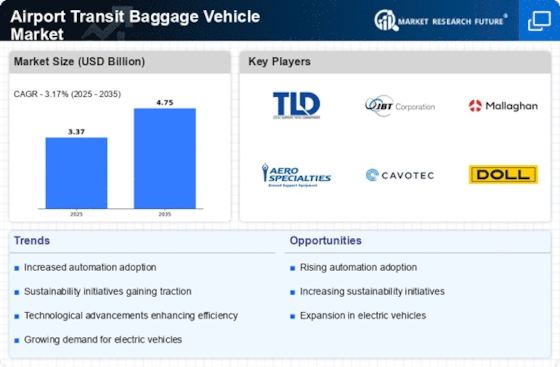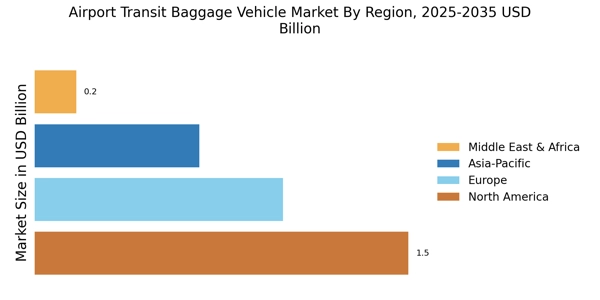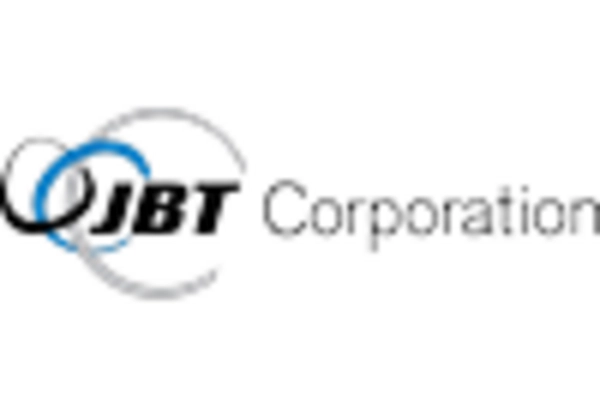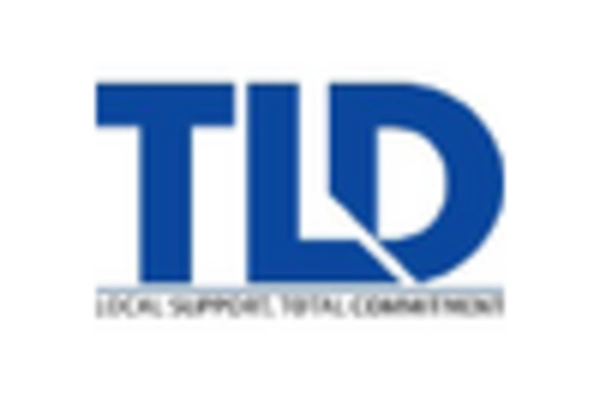Regulatory Compliance
The airport transit baggage vehicle Market is significantly influenced by regulatory compliance requirements imposed by aviation authorities. These regulations often mandate specific safety and operational standards for baggage handling vehicles. As airports strive to adhere to these regulations, there is a heightened demand for vehicles that meet stringent safety and performance criteria. Compliance with these regulations can lead to increased operational costs, but it also drives innovation in vehicle design and technology. Manufacturers are likely to focus on developing vehicles that not only comply with current regulations but also anticipate future standards, thereby shaping the Airport Transit Baggage Vehicle Market.
Focus on Sustainability
Sustainability initiatives are becoming increasingly prominent within the Airport Transit Baggage Vehicle Market. Airports are under pressure to reduce their carbon footprints and enhance their environmental stewardship. As a result, there is a growing demand for electric and hybrid baggage vehicles that produce fewer emissions compared to traditional diesel-powered options. Recent studies indicate that the market for electric airport vehicles is expected to grow by 15% annually, reflecting a shift towards greener alternatives. This trend not only aligns with global sustainability goals but also presents opportunities for manufacturers to innovate and develop eco-friendly baggage vehicles, thereby influencing the Airport Transit Baggage Vehicle Market.
Technological Advancements
Technological innovations are playing a pivotal role in shaping the Airport Transit Baggage Vehicle Market. The integration of advanced technologies such as automation, IoT, and AI is enhancing the efficiency and reliability of baggage handling systems. For instance, automated baggage vehicles equipped with smart sensors can optimize routes and reduce transit times, thereby improving overall airport operations. The market for automated baggage handling systems is expected to grow at a CAGR of 10% over the next five years, indicating a robust demand for technologically advanced baggage vehicles. This trend suggests that airports are increasingly investing in modernizing their baggage handling processes, which directly influences the Airport Transit Baggage Vehicle Market.
Increasing Air Travel Demand
The Airport Transit Baggage Vehicle Market is experiencing a surge in demand due to the rising number of air travelers. As more individuals opt for air travel, airports are compelled to enhance their operational efficiency, particularly in baggage handling. This increase in passenger volume necessitates a corresponding rise in the number of baggage vehicles to ensure timely and efficient transit of luggage. According to recent data, the number of air passengers is projected to reach 8 billion by 2030, which could significantly impact the Airport Transit Baggage Vehicle Market. Consequently, manufacturers are likely to innovate and expand their product offerings to meet this growing demand.
Expansion of Airport Infrastructure
The expansion of airport infrastructure is a critical driver for the Airport Transit Baggage Vehicle Market. As airports undergo renovations and expansions to accommodate increasing passenger traffic, the need for efficient baggage handling systems becomes paramount. New terminals and facilities require a corresponding increase in baggage vehicles to ensure seamless operations. Recent reports suggest that airport infrastructure investments are projected to exceed 100 billion dollars over the next decade, which could significantly boost the demand for baggage vehicles. This expansion presents opportunities for manufacturers to supply advanced baggage handling solutions, thereby influencing the dynamics of the Airport Transit Baggage Vehicle Market.

















